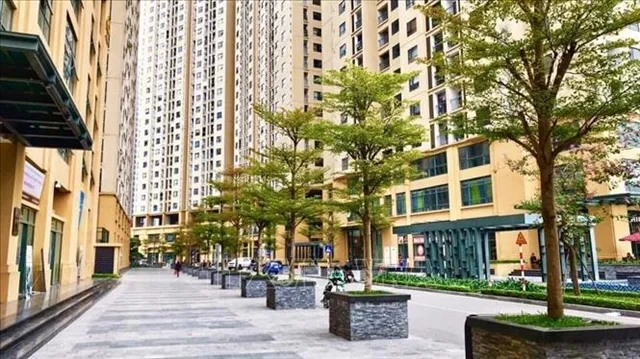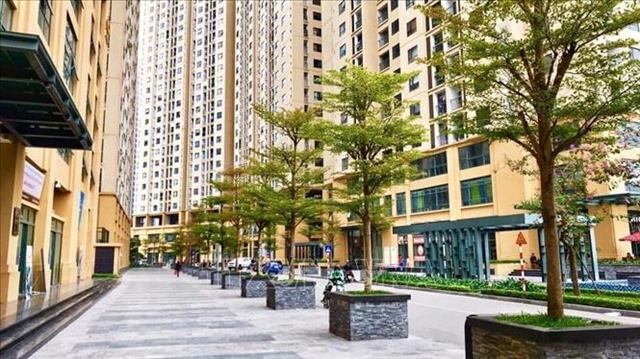Hà Nội has high demand for Grade A apartments in Q3
by ,http://vietnamnews.vn/economy/570714/ha-noi-has-high-demand-for-grade-a-apartments-in-q3.html06 January 2020 Last updated at 07:18 AM


HÀ NỘI – The real estate market of Hà Nội saw high demand for Grade A apartments for rent and sale in the third quarter, according to Savill Việt Nam’s quarterly report on Hà Nội's property market.
During the third quarter, about 4,330 new serviced apartments were offered on the Hà Nội market, decreasing 8 per cent quarter on quarter (QoQ) after the closure of two projects and the entry of one. Grade A had the strongest take-up while Grade B and C suffered decreases in leased units, said Đỗ Thu Hằng, Director of the Research and Consultancy Department at Savills Việt Nam’s branch in Hà Nội.
Grade A apartments must be built near convenient transportation systems, with good facilities and convenient social and service infrastructure. They also need a professional management and operation company.
“Despite providing the largest supply source, Grade A demand retained strong, especially powered by robust FDI inflows,” said Hoàng Diệu Trang, Savills Việt Nam’s Senior Manager on Commercial Leasing.
Average market-wide rent increased 4 per cent QoQ and occupancy remained high at 84 per cent. Within the Grade A segment, branded operators charged 19 per cent more for rent than non-branded counterparts, Hằng said at a recent press conference on releasing the third quarter report on Hà Nội property market.
Meanwhile, in the third quarter, 11 new and the next phases of nine projects of apartments for sale provided approximately 8,100 units, up 23 per cent QoQ and 17 per cent year-on-year. Grade B remained the largest supplier, accounting for 67 per cent of the market share, said Hằng.
Hằng said sales were down 1 per cent QoQ but up 50 per cent year-on-year due to high supply from Vingroup over the past year. Eastern districts had the highest sales in the quarter with a 40 per cent share.
Meanwhile, the HCM City market was more attractive than Hà Nội in terms of selling price, rent, rate of return and profit margin, Nguyễn Ngọc Hiếu, Head of Market Research Department of Batdongsan.com.vn, said at an event in Hà Nội on Tuesday to release its third quarter report on Hà Nội and HCM City property markets.
"Because Hà Nội's economy is developing well but HCM City is known as a leading city in economic development, most foreign companies in Việt Nam choose HCM City for their representative offices," Hiếu said.
This city has more diversification in real estate products than Hà Nội, he said. Besides that, it has attracted many workers and foreign experts so strong growth in population has made demand for accommodation and investment in HCM City's property market much higher than in Hà Nội in all segments.
Hiếu also said that demand for accommodation and investment in HCM City is always higher than Hà Nội. Many investors from Hà Nội have chosen HCM City to put their capital.
Batdongsan.com.vn’s data about the asking prices of apartments between Việt Nam’s two biggest real estate markets shows that in the third quarter, the average asking price of apartment in HCM City was 25 per cent higher than Hà Nội's. The gap reached nearly 40 per cent for apartments in the central areas of these cities.
Not only in the apartment segment, the average growth rate of house and townhouse prices in HCM City was also higher than in Hà Nội. The price of houses in Hà Nội was up about 10 per cent, while it was up to 26 per cent in HCM City.
Townhouses in the southern city also saw an average price increase of 12.6 per cent, compared to 7.6 per cent in Hà Nội.
In addition, during the third quarter, Savills Việt Nam saw the market share of studios and one-bedroom units rocket from 16 per cent in 1996 to 46 per cent in the third quarter this year, Hằng said.
Tenants are not only expatriates and corporate executives with long-term leases but individual business/MICE/leisure travellers with requests for short-term stays, she said. Working with dynamic online travel agents, more than 90 per cent of serviced apartment operators now meet monthly and daily requests instead of only annual contracts.
Beside traditional Japanese and Korean tenants, other Asian expatriates from Hong Kong, Singapore and China are expected to escalate demand. - VNS





